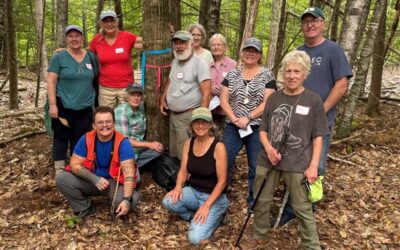Upcoming Events
Maine – About Us
The Maine chapter of The American Chestnut Foundation (TACF) was established in 1999 to help restore the American chestnut tree to our corner of America here in Maine. We live at the northernmost end of its natural range where chestnuts, like Mainers, make due with less sunshine and more cold. These suboptimal conditions made for sparser populations of chestnuts (and people) than southern climes, even before the blight.
Maine is currently home to more mature, flowering wild American chestnuts than any other state. Their success is due primarily to Maine’s geographic isolation from the denser populations of chestnut trees south of us, where the fungus spreads more readily. We have the joyful job of finding Maine’s wild trees and harvesting their nuts!
By growing chestnuts from wild trees, the Maine Chapter is preserving genes that have helped the chestnut adapt to life at the cooler edge of its range. Ultimately our gene conservation and breeding efforts are intended to produce hearty, blight-resistant populations of American chestnuts that we can use for forest restoration.
The chapter’s goals are to: 1) Protect, conserve, preserve, and propagate trees from the remaining native American chestnut populations in Maine; 2) Restore the American chestnut to a place of ecological and economic importance and self-sustainability throughout their original range in Maine, and 3) Make blight-resistant American chestnuts available to the people of Maine as soon as possible.
With your help we intend to restore this iconic species to Maine’s landscape, its wildlife, and its people.
Chestnuts Across Maine
Chestnuts Across Maine (CAM) is an exciting, new initiative of the Maine chapter of The American Chestnut Foundation (TACF). Our chapter is partnering with land trusts, state parks, schools, and town squares in Maine to establish small plantings of American chestnuts on lands open to the public. During our pilot year in 2024, ME-TACF coordinated plantings with 8 organizations! Learn more about Chestnuts Across Maine.
Board of Directors
Key Contacts
Mark McCollough, Chapter President
Eva Butler, Chapter Vice President, Volunteer Coordinator (Email)
Al Faust, Treasurer
James Day, Secretary
Thomas Klak, Chair of Gene Conservation
Eric Evans, Breeding Coordinator
Ann Rea, Seed Sales
Board Members
David Allen, Portland
Peter Bohman, Monmouth
Eva Butler, St George
James Day, Portland
Eric Evans, Camden
Albert C. Faust, Winterport
Dr. Tom Klak, Saco
Mark McCollough, Hampden
Dr. Nina Pearlmutter, Kennebunkport
Andy Reed, Unity
Dr. Brian Roth, Orono
Larry Totten, West Bath
Roger Willby, Bridgeton
Maine Chapter Menu
Latest News
December 2025 Newsletter Now Available
The newsletter of The American Chestnut Foundation Maine Chapter has arrived! Download it here. Inside, you'll find many stories about ME-TACF's work to restore the American chestnut: Maine Chapter plans a new seed orchard with Viles Arboretum Chestnuts at The Common...
Calling Volunteers to Chestnuts Across Maine
Chestnuts Across Maine (CAM) is an exciting, new initiative of the Maine chapter of TACF. Our chapter is partnering with land trusts, state parks, schools, and town squares in Maine to establish small plantings of American chestnuts on lands open to the public. This...
Chestnut Science Update
A Year of Change By Mark McCollough, Maine Chapter President “Learn to expect the unexpected.” As a wildlife biologist, I learned this tenet of ecology early in my career. Nature is full of surprises from the elegant workings of the DNA molecule to the intricate cogs...





